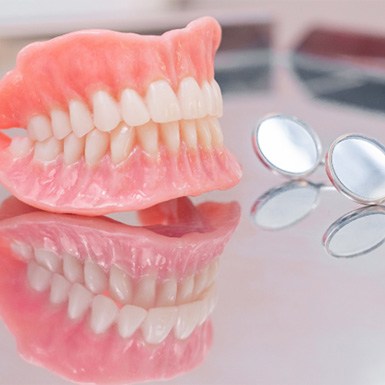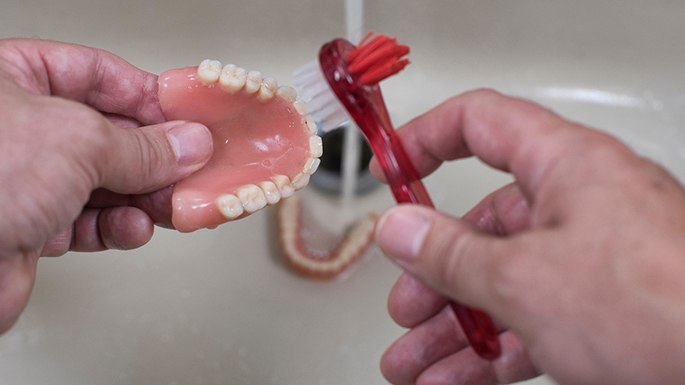Dentures – Philadelphia, PA
Custom Dental Prosthetics
to Complete Your Smile
Dentures have been around for hundreds of years, but they have improved with modern advancements. Better materials, innovative technology, and skilled dental professionals all lead to better-fitting, better-looking, and better-feeling dentures. At Dentex Dental Group, we take pride in the quality of our work, even if we have to start all over and replace lost teeth entirely. With your new dentures, you can overcome the challenges of tooth loss, so give us a call and schedule your consultation today!
Why Choose Dentex Dental Group for Dentures?
- Dental Implants Placed In-House
- Advanced Technology for More Precise Planning
- Caring, Service-Oriented Team of Dentists
Who's a Good Candidate for Dentures?

Dentures are a highly trustworthy method of tooth replacement, but are they suitable for your smile in particular? If you’re missing multiple teeth and are generally in good oral health, the answer is most likely yes. However, our team will still need to confirm that you’re a candidate for this treatment by carefully evaluating your oral health. If you’re wondering whether dentures are an ideal choice for you, don’t lose any time in reaching out to us.
Effects of Missing Teeth

Some people are tempted to try living their lives without replacing their missing teeth, but this is never a good idea. Tooth loss can put serious restrictions on what you’re able to eat; your diet will likely consist of fewer fruits and vegetables, and that can be very damaging to your overall health. Additionally, if you don’t have all your teeth, you might have trouble speaking clearly, which can hurt your social life and your career.
As such, it doesn’t matter what caused your tooth loss; you should make arrangements to see our team as soon as you can so that you can start figuring out the best way to have your grin restored. And in many cases, that means getting dentures.
What Qualifies You for Dentures?

Have you lost more than one tooth? Do you have a gum-disease-free mouth and a jaw with enough bone to support a dental prosthetic? If your answer to both of these questions is yes, you are most likely qualified to get dentures. We might also recommend them for patients who are expecting to have multiple teeth extracted due to decay.
Our team has experience working with a variety of patients, and we know exactly what to check for to confirm that dentures are a good choice for you. We’ll let you know if there are any issues that will need to be treated before you can have dentures made. Furthermore, we can go into more detail about the different kinds of dentures available (namely full, partial, and implant dentures) and explain which one is the best choice for your given situation.
Alternative Tooth-Replacement Options

No type of tooth replacement is the perfect choice for everyone. In some cases, you might find that dentures aren’t a good fit for you. Luckily, there are other options for you to consider:
- Dental bridges can be used to “bridge” a gap left by one tooth or at least two teeth in a row. The crowns at either end of the bridge will be attached to abutment teeth, allowing your new restoration to stay right where it needs to be.
- Dental implants are surgically embedded in your jaw. The right number of implants can be used to support various types of restorations to replace any number of missing teeth. You will only be able to get dental implants if you have a strong jaw that has the right level of bone density.
Types of Dentures

Although each denture is custom-made for the individual patient, there are three general types of dentures, which share some traits. All dentures have prosthetic teeth attached to a gum-colored base, and all are used to replace multiple missing teeth.
Partial Dentures

Getting dentures doesn’t necessarily mean you can’t keep some of your natural teeth. Partial dentures allow you to hold onto some of your real teeth and completes your smile a lot like a puzzle piece. Filling in these gaps is important because your remaining teeth would otherwise shift out of alignment, changing your bite and altering your appearance. Partial dentures make sure everything stay properly aligned.
Full Dentures

As the name suggests, full dentures replace a full arch of missing teeth. Instead of using clasps like partial dentures, this type utilizes natural suction. Essentially, the acrylic base fits snugly over the gums and creates suction, keeping the dentures in place. With these prosthetic teeth, you’ll not only regain the ability to eat and speak, but you can feel more confident in yourself!
Implant Dentures

If you are looking for a more permanent solution to secure your dentures, implants are just like having real teeth. With four to six posts embedded in the jawbone, we can then attach your dentures, giving them much more strength and stability. Implant dentures also prevent jawbone deterioration, which occurs when you lose tooth roots, meaning that you can continue using your implant dentures for decades!
How Dentures Are Made

Dentures that you see today aren’t like the ones that your grandparents used to wear. They are customized for each patient with the highest quality of materials available. To achieve a smile that matches you perfectly, getting dentures takes a multi-step process. Read on to learn more about dentures, what they are made from, and the process needed to create your unique smile.
What Are Dentures Made Of?

Dentures are made up of two parts: the base and the replacement teeth. Here is what each one looks like.
- Base: The base is the foundational structure of the replacement teeth. It can be made from a variety of materials, but acrylic tends to be the most popular option because it looks so similar to natural gum tissue.
- Teeth: Most of the time, the replacement teeth that are attached to the base of the denture are crafted from resin or porcelain. Both of these materials look similar to real tooth enamel. They even reflect light in a similar way.
The Denture Creation Process

All dentures are customized, so each treatment plan is a little bit different. Here are the steps that take place.
- Measurements are taken of the jaw, and impressions are made of the upper and lower gum tissue. These are used to create a plaster model of your mouth.
- The model is sent to the dental lab where your dentures are created. First, your replacement teeth are set in place with an articulator. Then, adjustments are made by the lab technician.
- The wax dentures are sent to your dentist for a fitting. If everything looks and feels good, they are returned to the dental lab to complete the process.
- After the dentures are back at the lab, the wax needs to be replaced with acrylic. To do this, the lab technician places the dentures in a flask. Plaster is then poured into it to maintain the shape of the dentures. The whole flask is placed in hot water to melt away the wax.
- The plaster is cut from the dentures with dental tools. Then, the dentures are placed in an ultrasonic bath to wash away the remaining plaster.
- Excess acrylic is cut from the dentures. Then, they are polished to perfection.
- The dentures are returned to our practice. If you and your dentist are happy with the results, you can leave the practice showing off a complete smile!
Adjusting to Your New Dentures

When you first get your new prosthetic, you might notice some soreness. This is normal as your mouth adjusts to your new smile. Your dentures will start to feel more natural over time. When you first get dentures, it is ideal to stick to a soft diet and exercise your facial muscles. As you get more comfortable with your dentures, you can start to introduce tougher foods. If discomfort persists or you have concerns, give us a call so we can help.
Benefits of Dentures

If you’ve ever gone any amount of time without dentures or with dentures that don’t fit correctly, you are already aware of the struggles that come with inadequate dentition. Without teeth, it is much more difficult to eat a nutritious diet of fruits and vegetables. In addition, speaking clearly can become a challenge. You may also feel self-conscious about how you look without teeth, causing you to hide your smile or even go out in public at all. Dentures, especially implant dentures, address all of these concerns and help you regain function and confidence in your smile. Here are some of the benefits that you can expect.
Psychological Benefits

People who don’t have teeth often have difficulty accepting their tooth loss. This can have a significant impact on self-esteem and social life, as well as a higher risk of experiencing sadness and depression. By replacing missing teeth with dentures, patients are likely to experience increased confidence and self-esteem. Dentures can reduce anxieties about appearance, speech articulation, chewing ability, and more while engaging socially.
Clearer Enunciation

Missing teeth can make it more difficult for you to speak clearly. To pronounce and perform words, your lips are tongue need to be positioned properly. Without being able to touch your tongue to your teeth, some words are very difficult to say clearly. Dentures act as your missing teeth, therefore allowing you to enunciate more clearly while speaking. After a little bit of practice, speaking will come naturally.
Improves Nutrition

Many nutritious foods are tough in texture. This includes certain vegetables, fruits, and healthy proteins. When you can’t chew your food thoroughly due to tooth loss, you can experience indigestion and malnutrition. With an improved ability to chew, you can enjoy a more expansive diet full of nutritious foods. Ultimately, dentures can help the body to receive the nutrients it needs to stay healthy.
Preserves Oral Health

If you still have some remaining natural teeth, getting dentures can keep them from shifting around and becoming misaligned. Dentures can bear some of the weight of regular chewing, therefore reducing the wear and tear of your natural teeth.
Expands Opportunity

Your smile is one of the first things that people notice about you. When it comes to your professional life, it is crucial that you make a great first impression. Having a complete smile is certainly an advantage.
Dentures Aftercare

Perhaps you assume that your false teeth don’t need to be maintained because your dentures won’t get cavities, right? This may be true, but these prosthetics can wear down, and food and plaque buildup can still lead to a gum infection, which can damage your jawbone and gum tissue. As a result, taking care of your dentures is essential if you want them to last as long as possible.
Plus, if you are going to go through the trouble of replacing your missing teeth, you should want to keep your replacements looking clean and beautiful!
Removable Dentures
If you have the ability to take out your dentures, there are certain times when doing so becomes necessary to preserve them and keep plaque and bacteria to a minimum.
Remove After Eating
We strongly recommend taking your dentures out of your mouth following eating, especially after meals, and at least rinsing them off. Bits of food could get stuck underneath your dentures, and if this debris isn’t cleared away, it could not only feel uncomfortable when you chew in the future, but it could also turn into plaque, which may lead to gum disease.
Clean Your Restoration
Although your prosthetic teeth will not contract cavities, they still need to be cleaned on a daily basis. Your dentures should be brushed and flossed to make sure the teeth are pristine, and you should also gently brush the inside of the dentures to prevent calcium buildup.
At least every other day, if not every day, you should use a denture cleanser so your teeth smell fresh and stay pristine.
Keep Your Dentures Safe
Some patients who wear dentures get a false sense of security and think they can suddenly eat things they never could or should. For instance, your dentures are not meant to chew ice, pencils, or pens. Doing so can damage the prosthetic and probably won’t feel good. You’ll preserve your dentures better in the long run if you chew only on safe foods.
Remove Dentures When You Sleep
While you sleep is the perfect time to give your gums a break and soak your dentures in water or cleanser. Your mouth produces less saliva at night, which means oral bacteria tend to spread more easily. In addition, dentures need to stay moist, so putting them in a glass of water can keep them hydrated when you go to bed.
Notice Changes
Over time, your dentures will start to fit differently than they did when you first got them because your jawbone is slowly changing below the gums. As a result, your prosthetic teeth may not be as secure as they once were. Pay attention to the changes in fit and tell us about your observations. Every year or so, we may need to make adjustments to keep your dentures feeling stable and strong.
All-on-4 Dentures
Unlike the kinds of dentures that are easily removed, All-on-4 dentures are fixed into place. As a result, you shouldn’t run into the problem of getting bits of food underneath your prosthetics, and maintaining them looks a lot like maintaining regular teeth. Brushing twice and flossing once daily should help keep your replacement teeth and your gums in excellent shape. Also, regular appointments with our team makes sure that we catch any issue as early as possible.
Understanding the Cost of Dentures

Since each denture is customized to meet the patient’s particular needs, the cost of one set can vary significantly from that of another. When you have your consultation, our dentist will thoroughly explain your needs and pricing options for your denture treatment, and our team will be more than happy to answer any questions you might have. Here’s a brief guide to how dentures are priced, but don’t be afraid to contact us for more information.
Factors That Affect the Cost of Dentures

The cost of your dentures will be influenced by three primary factors. These are:
- How much preparation your mouth needs before receiving dentures. This can include periodontal treatments, tooth extractions, and other procedures.
- What kind of acrylic is used for the base so that it can properly match the appearance of your natural gum tissue.
- The material used for your replacement teeth, which need to be lifelike and sturdy.
It’s always important to remember that the cheapest option is not the ideal option. Cheap dentures are often improperly shaped and made from inferior materials, making them likely to break or cause oral health problems such as TMJ issues later on.
Are Implant Dentures More Expensive?

While implant dentures are more expensive than traditional dentures, it is for a very good reason. While traditional dentures can be a wonderful way to replace lost teeth, they do not address the problem of bone loss in the jaw and can eventually lose their fit as the mouth changes shape. By placing dental implants in the jaw and anchoring the denture to them, our team can ensure that your appliance holds its place securely while stimulating the jawbone, preventing or even reversing bone loss. Implant dentures allow the patient to eat and speak more confidently, and they can last much longer than the traditional variety.
Does Dental Insurance Cover Dentures?

Dentures are considered a major dental procedure and their overall cost is typically covered by about 50% by most dental insurance plans. While this can do a lot to make your dentures much more affordable, the details of different dental plans vary considerably. If you need any help understanding what your insurance provider will pay, our team will be happy to sit down with you to help you figure out how to get the most out of your policy. If you would like assistance with understanding the overall cost of a customized set of dentures, contact our office to schedule a consultation.
Denture FAQs
Can I Sleep with My Dentures?
The dentures you get from us will be incredibly comfortable, so much so that you may wonder if it’s possible to sleep with them in. This is a common mistake.
We usually recommend that you only wear your dentures all night for the first 24 hours of having them, but after that, it’s usually necessary to take them out while you sleep. This gives your gums a chance to rest and allows you to soak your prosthetic in a cleaning solution.
If you make a habit of leaving your dentures in overnight, you’re likely to wind up with more sore spots than you’d like and bacterial growth under your prosthetic.
What is the Average Age for Dentures?
The National Center for Health Statistics found that around 66% of adults between the ages of 40 and 64 are missing at least one tooth, compared to only 33% of adults 20-39. Tooth loss is a bigger concern for older people, which is why the American Dental Association found that nearly 57% of people ages 65-74 wear a denture. This has given dentures a reputation for being associated with seniors.
That said, people can lose teeth at any age, and for all kinds of reasons. Our dentures look realistic and can be extremely powerful, so you shouldn’t be shy about getting a prosthetic no matter how old you are.
Is It Hard to Talk with Dentures?
Talking properly is remarkably complicated, involving a complex interplay between the teeth, lips, and tongue. As a result, putting in dentures could make it a little bit difficult to speak at first. Patients sometimes say they wind up with something like a lisp after getting their new prosthetic.
That said, all you need to do is to work through the issue, learning to speak normally again. Try reading aloud, speaking slowly, and practicing talking with someone you trust. The more you do it, the less your dentures will impact your speech in the long run.
Will Dentures Change the Shape of My Face?
Your teeth do more than just smile and chew; they also support the facial muscles, making your cheeks look full. Without them, it’s common for your cheeks to look hollow and sunken, which can make you look a bit older.
Getting dentures will provide these facial muscles some much-needed support, making your face look full and youthful again.


 (215) 677-2401
(215) 677-2401